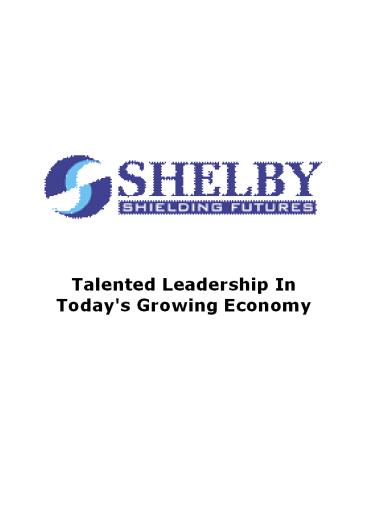Talented Leadership In Today's Growing Economy - PowerPoint PPT Presentation
Title:
Talented Leadership In Today's Growing Economy
Description:
The Survey report emphasizes that talent management is a higher priority for CEOs. As the demand for important skills grows, you risk losing them. Talent Acquisition Consultants focus on the rigorous quality needed to meet today's challenges as it encourages organizations to continue investing in their employees. The role of talent acquisition leaders today is becoming more complex and demanding, and there is no doubt that it is rarely recognized by organizational leaders. – PowerPoint PPT presentation
Number of Views:24
Title: Talented Leadership In Today's Growing Economy
1
Talented Leadership In Today's Growing Economy
2
The Survey report emphasizes that talent
management is a higher priority for CEOs. As the
demand for important skills grows, you risk
losing them. Talent Acquisition Consultants focus
on the rigorous quality needed to meet today's
challenges as it encourages organizations to
continue investing in their employees. Current
resource trends Only half of the CEOs have talent
management as an important priority. There is no
change in in-house human resource development,
focusing on retention rather than
recruitment. Increased turnover rates have
resulted in improved salaries, profits, learning
and development opportunities, and line manager
skills. Permanent vacancies are increasing,
especially in the private sector. Companies are
becoming more active in the workforce's
diversity, especially in the public sector,
manufacturing, and production sectors. Graduate
apprenticeship and recruitment programs are
increasing. Companies are focused on improving
employer branding through career websites and a
better candidate experience. Private sector
resource budgets have a more positive outlook.
Without the right people in place, talent
acquisition can't work or grow. Despite people
being valued as the organization's best assets,
talent leaders need to deal with tight budgets
and other internal and external pressures that
make their roles increasingly difficult.
3
- Talent Acquisition Leader Attributes
- The role of talent acquisition leaders today is
becoming more complex and demanding, and there
is no doubt that it is rarely recognized by
organizational leaders. - As the "forgotten hero" of every company, talent
acquisition leaders demonstrate outstanding
leadership, resources, and talent management
expertise. So how can this be quantified? - By working with talent acquisition leaders to
provide customized - training programs, you can directly see these
attributes, which can be defined as - Motivational leadership
- Set an example and lead as an ambassador for
teams and organizations with a clear focus on
ethics, diversity, open communication, teamwork.
And also, the values that display and promote
employer brands and employee value propositions. - Organizational leadership
- Understand the concept of performing lean
recruitment functions by designing, building,
and implementing more productive ways of working
and demonstrating a return on investment. - Stakeholder management
- Have the knowledge, style, and seriousness to
work well and influence internal leaders to
support (and invest in) internal recruitment
capabilities. - Tactical workforce planning
- Move from reactive recruitment to proactive
class-leading talent through accurate
predictions that enable recruiting teams to
build the right talent stream. - Fostering successors
- Build a reputation as an employer that
understands your business needs, supports
diversity and inclusiveness, and attracts and
nurtures leadership talent.
4
- Social contract
- Understand how to identify different online
recruitment channels, promote your employer's
brand to attract and retain your candidate's
interest. - Mobile contract
- It provides candidates with a seamless mobile job
search and app experience, enabling recruitment
managers and recruiters to screen and select the
right candidates through their mobile devices. - Employment analysis
- Understand how data can provide the intelligence
needed to inform ongoing talent management and
development and strategic and tactical workforce
planning. - Team development
- Identify the skills you need and provide the
right resources and support to help team members
train and develop effectively while encouraging
them to do so. - Management development
- They support managers who lead and develop teams
to become certified in-house resource experts.































